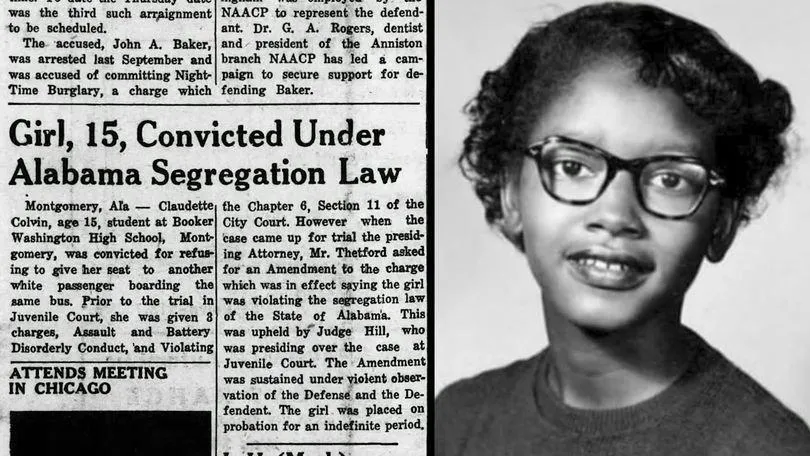
Juneteenth NY Blog

Claudette Colvin - The Unsung Hero Who Refused to Give Up Her Bus Seat in 1955
Claudette Colvin - The Unsung Hero Who Refused to Give Up Her Bus Seat in 1955

In the history of the Civil Rights Movement, there are well-known heroes, but there are also those whose stories remain untold for too long. One such hero is Claudette Colvin, a brave teenager who, on March 2, 1955, refused to give up her bus seat to a white woman in Montgomery, Alabama. This act of defiance came nine months before Rosa Parks' similar and more widely known protest. Yet, Claudette’s courage played a crucial role in sparking the movement that led to desegregation. Let’s dive deeper into her story and the lasting impact she had on civil rights.
When thinking of the Civil Rights Movement, the name Rosa Parks often comes to mind as a pivotal figure. However, Claudette Colvin, a 15-year-old high school student, took a stand against segregation on a Montgomery bus months before Parks’ iconic protest. Claudette’s refusal to give up her seat may not be as well-known, but it was just as important in the fight against racial segregation in the United States. Her bravery set the stage for a larger movement, contributing to key legal battles that would eventually end bus segregation in the South.
Who Was Claudette Colvin?

Early Life and Background
Claudette Colvin was born on September 5, 1939, in Montgomery, Alabama. Raised in a segregated society, she experienced firsthand the harsh realities of Jim Crow laws, which enforced racial segregation in the South. She grew up in a close-knit community and attended school at Booker T. Washington High, where she was a diligent student who aspired to be a lawyer.
Growing Up in Segregated Alabama
Life in 1950s Alabama was difficult for African Americans. Segregation was present in schools, public facilities, and transportation. African Americans were expected to give up their seats to white passengers on buses, and if a white person stood, they were required to move to the back of the bus. It was within this context that Colvin decided enough was enough.
The Day of Defiance - March 2, 1955
The Bus Ride That Changed History
On March 2, 1955, Colvin boarded a segregated bus on her way home from school. As the bus filled up, a white woman demanded her seat, but Colvin refused to give it up. She wasn’t trying to make a political statement; she was simply tired of the injustice she had endured daily.
What Claudette Colvin Did on That Fateful Day
Despite being ordered by the bus driver to vacate her seat for the white passenger, Colvin remained seated. In her own words, she felt like she had Harriet Tubman and Sojourner Truth on her shoulders, guiding her to stand firm. This act of defiance led to her arrest by local police.
The Consequences of Her Courage
Arrest and Immediate Repercussions
Claudette was forcibly removed from the bus, arrested, and charged with violating segregation laws. The arrest was particularly traumatic as she was treated harshly by law enforcement. She was initially charged with disturbing the peace, breaking segregation laws, and assaulting a police officer.
Legal Battles that Followed
Although Colvin pleaded not guilty, she was convicted in juvenile court. However, her fight wasn’t over. Her arrest became one of the catalysts for the landmark Browder v. Gayle case, which challenged the constitutionality of bus segregation laws in Montgomery.
Claudette Colvin vs. Rosa Parks
Why Rosa Parks’ Story Became More Famous
Although Claudette’s protest came first, it was Rosa Parks’ refusal to give up her seat that gained widespread attention. There are several reasons for this. Parks was older, more established in the community, and her case was strategically chosen by civil rights leaders to challenge segregation laws.
How Claudette’s Age and Status Played a Role
Colvin’s youth and status as an unmarried, pregnant teenager complicated her image in the eyes of the movement’s leaders. They feared her personal situation might distract from the message they wanted to send.
The Legal Impact of Claudette Colvin’s Actions
Browder v. Gayle – The Court Case That Ended Segregation
Colvin was one of the plaintiffs in Browder v. Gayle, the case that ultimately led to the Supreme Court ruling that segregation on public buses was unconstitutional. This legal victory was a direct result of the protests started by individuals like Claudette.
Claudette’s Role in the Landmark Case
Her testimony in Browder v. Gayle was crucial. She bravely stood up in court to tell her story, helping to dismantle the system of bus segregation that had long oppressed African Americans.
Life After the Bus Incident
Moving Away from Montgomery
After her role in the movement, Colvin moved to New York City, where she lived a quieter life. She worked as a nurse’s aide for many years, raising her family out of the spotlight.
Claudette’s Continued Activism
Although her public activism faded, Claudette never stopped advocating for civil rights. Her contributions, though long overlooked, were a key part of the larger movement.
Recognition of Claudette Colvin's Contribution

The Long Wait for Recognition
It wasn’t until decades later that Claudette Colvin began receiving recognition for her bravery. Her story was overshadowed for years, but in recent times, historians and civil rights activists have made sure her name is remembered.
Awards and Honors in Recent Years
In the 2000s, Colvin was finally acknowledged with awards and public recognition for her role in the Civil Rights Movement. She was honored with numerous accolades for her courage and contribution.
The Importance of Colvin’s Legacy
How Claudette’s Story Inspires Future Generations
Claudette Colvin’s story is a powerful reminder that change often begins with ordinary people taking extraordinary stands. Her courage has inspired future generations to fight for justice, proving that youth can make a difference.
The Power of Youth in Civil Rights Movements
Claudette’s actions serve as a testament to the role of young people in social movements. Her courage shows that age is no barrier to making a meaningful impact.
Conclusion
Claudette Colvin’s brave stand on March 2, 1955, helped spark a legal and cultural revolution in America. Although her name might not be as widely known as some other figures in the Civil Rights Movement, her contributions were vital to dismantling the system of segregation that plagued the country for decades. Her story is one of perseverance, courage, and a refusal to accept injustice.

FAQs
When did Claudette Colvin refuse to give up her seat?
On March 2, 1955, in Montgomery, Alabama.How old was Claudette Colvin at the time of the incident?
Claudette was 15 years old when she refused to give up her seat.What was the significance of Browder v. Gayle?
Browder v. Gayle was the court case that led to the Supreme Court ruling bus segregation unconstitutional.How is Claudette Colvin honored today?
She has received recognition through various awards and honors, especially in the 2000s, for her role in the Civil Rights Movement.
What is the key difference between Claudette Colvin and Rosa Parks' stories?
The key difference is that Rosa Parks' protest was more publicized due to her established role in the community, while Claudette was a young, lesser-known figure.


For other questions or comments about JuneteenthNY, please give us a call at 646-585-0456 or send us an email. We will get back to you within 24 hours.





Facebook
Instagram
X
LinkedIn
Youtube
TikTok